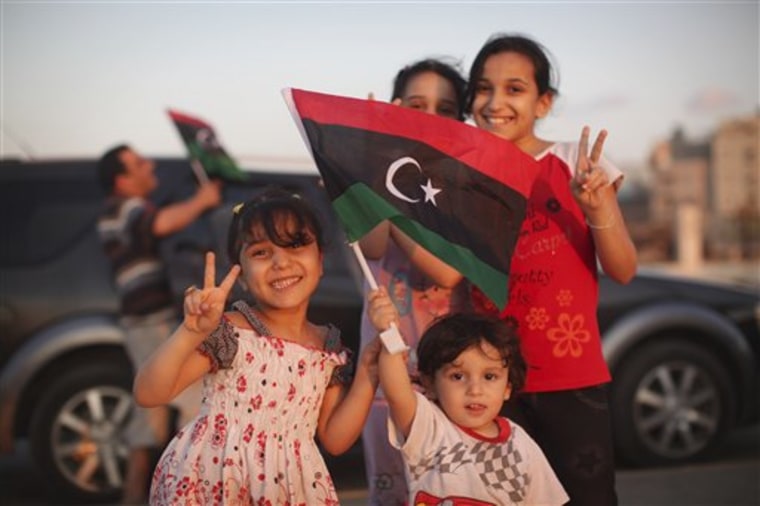Through months of military stalemate in Libya it was an open secret among NATO allies that countries inside and outside the alliance were quietly but crucially helping rebels gain their footing against the much stronger forces loyal to longtime dictator Moammar Gadhafi.
Covert forces, private contractors and U.S. intelligence assets were thrown into the fight in an undercover campaign operating separately from the NATO command structure. Targeted bombings methodically took out Gadhafi's key communications facilities and weapons caches. And an increasing number of American hunter-killer drones provided round-the-clock surveillance as the rebels advanced.
These largely unseen hands helped to transform the ragtag rebel army into the force storming Tripoli.
Covert teams
Diplomats acknowledge that covert teams from France, Britain and some East European states provided critical assistance, without — they contend — compromising NATO's mandate from the United Nations to restrict its operations to protecting civilians.
The aid included logisticians, security advisers and forward air controllers for the rebel army, as well as intelligence operatives, damage assessment analysts and other experts, according to a diplomat based at NATO's headquarters in Brussels. The diplomat spoke on condition of anonymity due to the sensitivity of the issue.
The CIA and other U.S. intelligence agencies have been gathering information throughout the conflict from contacts they'd developed when they were working closely with Gadhafi's government on counterterrorism against al-Qaida-related Islamic militant groups operating in Libya. This thawing of relations between two longtime adversaries, lasting only a few years, paid unexpected dividends later.
Foreign military advisers on the ground were key to getting real-time intelligence to the rebels, helping them accurately concentrate their limited firepower on the enemy. One U.S. official, speaking on condition of anonymity to discuss intelligence matters, said the Qatari military led the way, augmented later by French, Italian and British military advisers. This effort had a multiple purpose, not only assisting the rebels but monitoring their ranks and watching for any al-Qaida elements trying to infiltrate or influence the rebellion.
Bolstering the intelligence on the ground was an escalating surveillance and targeting campaign in the skies above. Armed U.S. Predator drones helped to clear a path for the rebels to advance.
Constant surveillance
The addition of U.S. drone aircraft into the Libyan theater was important to the rebels, in giving them access to constant surveillance of the terrain, said Gen. Jean-Paul Palomeros, the French Air Force chief of staff.
"The better the intel is, the more valuable it is," Palomeros told The Associated Press. "It's part of an ensemble: Time was also needed for the opposition forces to get organized."
Allied officials, who spoke on condition of anonymity to discuss military operations, said that at the onset of the conflict, the bombing campaign stretched along the length of the coast. Over time, as major regime resources were destroyed, the coalition was able to narrow the focus of its strikes.
"We simply followed the way the opposition fronts moved," said the NATO official. "Gadhafi's forces usually came out to meet the rebels, and that's when we struck."
In recent weeks, as the U.S. added more drones to the fight, they were able to do precision strikes closer to the cities, shadowing the rebels as they advanced through Zawiya and roared into Tripoli.
Over that time, Britain's National Security Council noted that cooperation had grown between NATO and the rebel groups, particularly in the coordination of airstrikes, according to one official familiar with the outcome of the meetings. After Britain and other nations send soldiers to Libya to provide training, it became apparent that rebel forces had improved their capabilities.
Combined with increasingly precise air strikes by allied forces, the rebels gradually wore down Gadhafi's forces, ruptured supply lines, and allowed more money and resources to flow to the opposition.
In short, NATO bought them time.
Breathing room
The allied bombings, coupled with the no-fly zone, the arms embargo and the Navy ships patrolling along the coast, all gave the rebels breathing room as they gathered arms and ammunition. Slowly, they were able to transform into a moderately effective fighting force.
NATO warplanes have flown nearly 20,000 sorties in the past five months, including about 7,500 strike attacks against Gadhafi's forces. As of Monday, the U.S. alone had flown more than 1,200 strike sorties, dropped bombs in 262 of them, and unleashed 84 Predator strikes.
According to NATO, strikes hit more than 40 targets in and around Tripoli in the past two days — the highest number on a single geographic location since the bombing started more than five months ago.
British fighter jets destroyed a number of major targets in Tripoli on Sunday, helping the rebels to sweep into the Libyan capital.
"With Free Libyan Forces advancing into Tripoli, U.K. forces continued to strike at Colonel Gadhafi's remaining apparatus of repression within the city, as NATO maintained pressure on the former regime," said Maj. Gen. Nick Pope, spokesman for Britain's military chief Gen. David Richards.
Tornado and Typhoon jets fired on an intelligence operations site in Tripoli before dawn on Sunday, and later in the day destroyed a battle tank on the city's outskirts.
___
Lekic reported from Brussels. Associated Press writers David Stringer in London, Jamey Keaten in Paris and Kimberly Dozier in Washington contributed to this report.
